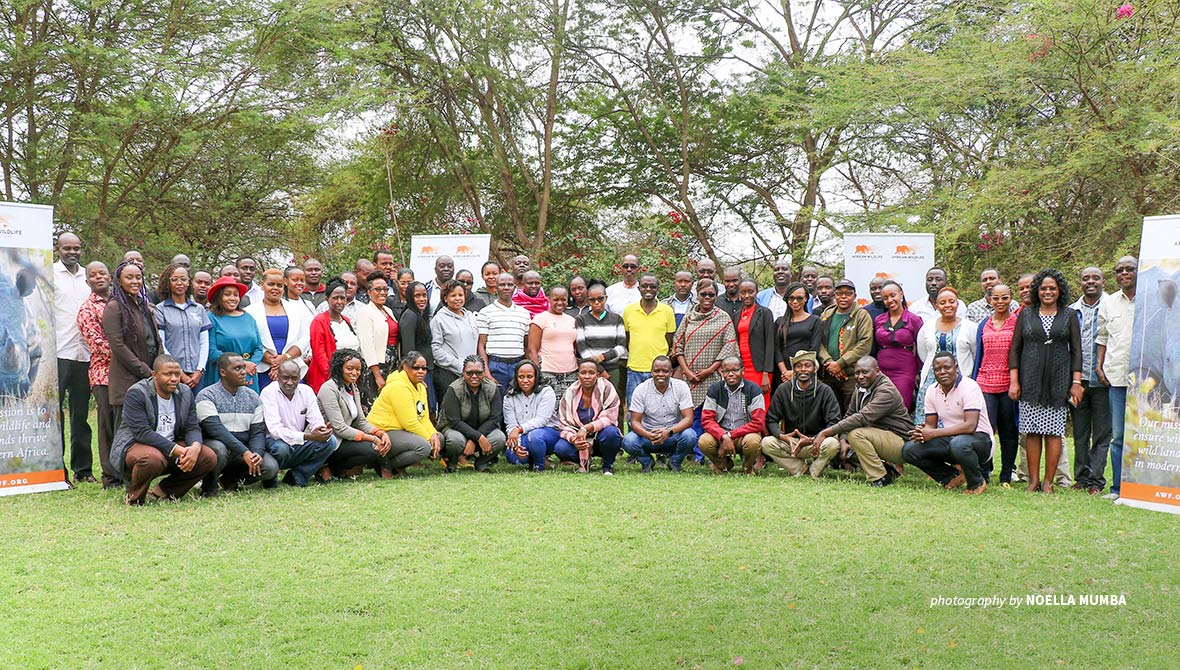AWF Convenes Cross-Sectoral Judicial Symposium on Wildlife Crimes
General Inquiries
Tel:+254 711 063 000
Ngong Road, Karen, P.O. Box 310
00502 Nairobi, Kenya

This week, The African Wildlife Foundation (AWF), under the Bureau of International Narcotics and Law Enforcement Affairs (INL) grant, organized a two-day Cross-Sectoral Judicial Symposium for judicial and prosecutorial officers in Kenya. In attendance were wildlife crime justice fraternity, including magistrates, judiciary, prosecutors, the Office of the Director of Public Prosecution (ODPP), and implementation partners — the International Fund for Animal Welfare (IFAW), representatives from the Law Society of Kenya (LSK), Kenya Wildlife Service Law Enforcement Academy (KWS LEA), and investigators from the Tsavo and Amboseli ecosystems.
Attended by 60 participants, the workshop aimed at raising awareness of wildlife crimes and providing space for these officers to exchange experiences in the investigation, prosecution, and adjudication of wildlife crime cases. AWF’s Tsavo-Mkomazi Landscape Manager Kenneth Kimitei opened the workshop by giving an overview of the prevalent threats facing wildlife conservation in Tsavo. He highlighted the importance of collaborations in the fight against wildlife crimes.
“The key objectives of the counter wildlife trafficking initiatives are to enhance detection, enhance law enforcement capacity, and address emerging crimes. There are three units under the counter wildlife trafficking; The Wildlife Judicial and Prosecutorial Assistance Training Program (WAJPAP), Canine for Conservation, and Cybercrimes, which addresses emerging crime. WAJPAP, which mainly focuses on strengthening prosecution, carries out analyses of laws and cases, supports enforcement, and undertakes sensitization, which is reminiscent of today’s event,” said Ernest Agina, AWF’s Manager of Cybercrime Investigation.
With an emphasis on the emerging issues and cybercrime, he encouraged continued awareness of the audience on the convergence of crimes, specifically the role of digital and electronic storage devices and underscored the importance of continuous learning in the dynamic age of technology.
“This symposium is a continuation of the Wildlife Judicial and Prosecutorial Assistance Training Series conducted by AWF. It is part of the advocacy and sensitization of judicial and prosecutorial officers on the continent,” said Benson Kasyoki, Legal Officer overseeing AWF’s court monitoring program.
In her presentation, Honorable Mildred Obura, Chief Magistrate, Voi Law Courts emphasized the importance of promoting interactive engagement with key stakeholders on investigating, prosecuting, and adjudicating wildlife crimes within their respective jurisdictions. The Magistrates’ Court is the focal point and plays a crucial role in the administration of justice, and in this case, in the adjudication of wildlife crimes.
In addition, the Wildlife Conservation and Management Act provides for stiff penalties as a deterrent in combating instances of rampant wildlife crimes and offences related to the degradation of the environment through illegal logging activities and grazing in game reserves.
“At Voi Law Courts, in 2021, we had 146 wildlife cases filed, out of which 139 cases have been finalized. Between January 2022 to August 2022, 67 new cases were filed. 50 cases have been concluded so far and 17 cases are pending. Most of the cases resulted in convictions. The majority of the cases include dealing in wildlife meat, being in possession of wildlife trophy, unlawful entry into the park with livestock,” noted Hon. Obura.
Victor Simbi, a Voi-based Prosecutor from ODPP led the discussions on the effective prosecution and the impact of enhanced sentences in wildlife conservation. He urged his peers to play a more active role in ensuring that the Prosecution Guided Investigation is adhered to. (Chain of custody and keeping /preservation of exhibit)
In addition to the legal frameworks developed by several African countries to combat wildlife crime, it is crucial to create public awareness to effectively enforce the laws. Cross-sectoral collaborations will seal the loopholes that wildlife traffickers and poachers take advantage of while committing wildlife crimes.
AWF acknowledges that such a multi-agency approach will help them better comprehend wildlife crimes, as well as highlight the major challenges in the fight against wildlife crime, and foster dialogue among the officers. This will ultimately enhance wildlife security on the continent.